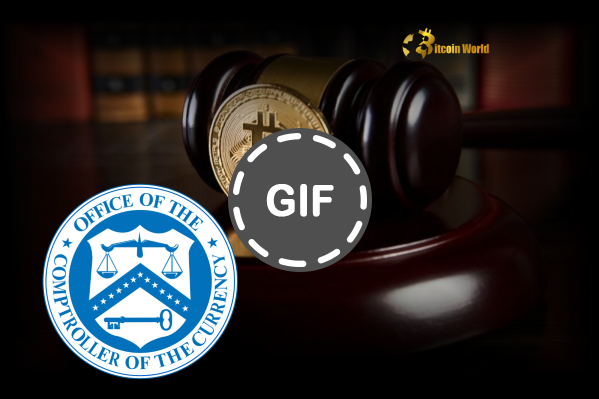BitcoinWorld

Cryptocurrency Regulation: Crucial Warning as US OCC Asserts Federal Power
Hey crypto enthusiasts and industry watchers! Ever wondered who really calls the shots when it comes to regulating the digital assets you hold and trade? It’s a question that’s been buzzing for years, and a recent assertion from a key US financial regulator has brought it back into the spotlight, sparking debate about the future of Cryptocurrency Regulation in the United States.
What Did the US OCC Director Actually Say?
The conversation kicked off when Eleanor Terrett, host of Crypto in America, reported via X (formerly Twitter) on comments made by Rodney Hood, who was serving as the Acting Director of the US OCC (Office of the Comptroller of the Currency). The core of his message was a reaffirmation of a long-standing principle in the US financial system: that federal banking regulation holds a superior position to state-level laws when there’s a conflict.
Now, you might be thinking, ‘Okay, but what does banking regulation have to do directly with crypto?’ Well, that’s where things get interesting and a bit complex. While many cryptocurrencies aren’t traditional bank deposits or loans, activities like stablecoin issuance, crypto custody services, and lending platforms often intersect with traditional banking functions or are offered by entities that also engage in banking-like activities. The OCC supervises national banks and federal savings associations, and its stance on federal preemption can significantly influence how these institutions interact with or offer crypto-related services.
Hood’s assertion, though rooted in established legal principles regarding banking, is being interpreted by some as a potential signal regarding the OCC’s view on its role in overseeing the evolving digital asset space. Given the patchwork nature of current crypto rules, any clear statement on jurisdictional priority from a major federal regulator like the OCC is noteworthy.
Why Are Crypto Insiders Concerned About Increased Federal Banking Regulation?
Eleanor Terrett’s report also highlighted a crucial point: the concerns voiced by some insiders within the crypto community. Their worry isn’t just about who regulates, but how. The fear is that the OCC’s assertion could be a precursor to a more aggressive expansion of Federal Banking Regulation into areas currently less defined or primarily addressed at the state level. Why the apprehension?
- Potential for Stifled Innovation: States have often been seen as ‘laboratories of democracy,’ allowing for different regulatory approaches to emerge. Some in crypto believe this state-level experimentation is crucial for allowing new technologies and business models to develop before rigid federal rules are applied. Increased federal control could lead to a more uniform, potentially less flexible, regulatory environment.
- One-Size-Fits-All Rules: Federal regulations, by their nature, tend to be broad to apply across diverse markets and business models. The crypto space is incredibly varied, from simple utility tokens to complex DeFi protocols. Insiders worry that broad federal banking rules might not adequately capture the nuances of different crypto activities, potentially imposing unsuitable requirements.
- Navigational Complexity: While federal preemption aims for clarity, the process of determining when and how it applies can be legally challenging. Businesses might face uncertainty if they operate across state lines or offer services that touch upon both state and potentially preempted federal areas.
- Impact on State Initiatives: Many states have proactively developed their own frameworks for digital assets (like New York’s BitLicense, Wyoming’s DAO laws, etc.). A strong federal preemption stance could potentially undermine these efforts, creating conflict and uncertainty for businesses that have complied with state requirements.
These concerns underscore a fundamental tension in the US regulatory landscape: balancing the need for national consistency and stability (often favored by federal regulators) with the desire for innovation and tailored approaches (sometimes seen as strengths of state regulation).
Navigating the Maze: State Regulatory Authority vs. Federal Power
Understanding this debate requires a quick look at the US’s unique dual banking system. We have banks chartered at the federal level (supervised by the OCC, the Federal Reserve, and the FDIC) and banks chartered at the state level (supervised by state banking departments and often also the FDIC and Federal Reserve, depending on their structure). This system has historically led to overlaps and debates about jurisdiction, particularly as financial products and services evolve.
When it comes to crypto, this dual system becomes even more complicated because crypto assets don’t fit neatly into existing categories. Is a stablecoin a security (SEC)? A commodity (CFTC)? A currency (Treasury)? A bank deposit (OCC/State Banking Depts)? The answer often depends on its specific characteristics and how it’s used, leading to multiple agencies claiming jurisdiction or parts of it.
State regulatory authority has been significant in the crypto space, partly due to a perceived lag in comprehensive federal action. States like New York, California, Wyoming, and Texas have developed specific licenses, charters, or legal interpretations for crypto businesses. The BitLicense in New York, for example, was one of the earliest and most comprehensive state frameworks for virtual currency businesses. Wyoming has been innovative with special purpose depository institution (SPDI) charters for crypto companies and legal recognition for Decentralized Autonomous Organizations (DAOs).
The OCC’s assertion of federal preemption, if applied broadly to crypto activities conducted by or related to national banks, could challenge the supremacy of these state-level rules in certain contexts. This doesn’t mean state laws become irrelevant entirely, but it could mean that in areas where federal banking law directly conflicts with or covers the same ground as state law regarding federally chartered institutions, the federal rule wins.
What Does This Mean for Overall Crypto Oversight?
The OCC’s stance is just one piece of the larger puzzle of Crypto Oversight in the United States. Multiple federal agencies are involved, each with different mandates:
- Securities and Exchange Commission (SEC): Focuses on whether certain crypto assets are securities and regulates exchanges and offerings involving securities.
- Commodity Futures Trading Commission (CFTC): Regulates crypto assets deemed commodities, particularly futures and derivatives markets.
- Financial Crimes Enforcement Network (FinCEN): Addresses anti-money laundering (AML) and counter-terrorist financing (CTF) aspects of crypto businesses (Money Service Businesses).
- Federal Reserve: Involved in stablecoin discussions, payment systems, and broader financial stability concerns related to crypto.
- Treasury Department: Looks at illicit finance risks and broader economic implications.
The OCC’s focus is primarily on the safety and soundness of the banking system and ensuring fair access to financial services. Their interest in crypto oversight stems from the increasing interaction between traditional finance and digital assets. When national banks want to hold crypto on behalf of clients, offer crypto lending, or engage with stablecoins, the OCC is their primary federal regulator. Hood’s statement reinforces the idea that the OCC believes its rules for these activities should take precedence for the institutions it supervises, even if states have different rules.
This complex web of regulators highlights a major challenge for crypto businesses operating in the US: navigating overlapping and sometimes conflicting requirements. Clarity on which regulator has authority over which activity is crucial for fostering responsible innovation while mitigating risks.
Challenges and Potential Benefits of This Regulatory Stance
Like any significant regulatory assertion, the OCC’s position presents both challenges and potential benefits:
Challenges:
- Uncertainty: Until the boundaries of federal preemption in the crypto context are fully tested and clarified through legal cases or further rulemaking, uncertainty remains for businesses.
- Reduced State Flexibility: Could limit states’ ability to experiment with novel regulatory approaches tailored to local industry needs or specific types of crypto activities.
- Potential for Conflict: May lead to legal battles between federal and state regulators or between businesses and regulators over jurisdictional claims.
Potential Benefits:
- National Consistency (for federally regulated entities): Could provide a clearer, more uniform set of rules for national banks and federal savings associations engaging in crypto, reducing compliance complexity across states.
- Enhanced Stability: Federal regulators often prioritize financial stability and consumer protection on a national scale, which could lead to more robust standards for certain crypto-related banking activities.
- Clearer Path for Banks: If national banks understand which federal rules apply and preempt state ones, it might encourage more participation from traditional finance in the crypto space, potentially bringing more capital and infrastructure.
Actionable Insights for the Crypto Community
So, what should crypto businesses, developers, and enthusiasts take away from this?
- Stay Informed: Regulatory landscapes are dynamic. Keep track of statements and actions from the OCC, SEC, CFTC, FinCEN, and state regulators.
- Understand Your Activities: Clearly define the nature of your crypto business activities. Are they more like securities, commodities, money transmission, or banking functions? This helps determine which regulators might have jurisdiction.
- Seek Legal Counsel: Operating across state lines or engaging in complex crypto activities warrants expert legal advice to navigate the federal and state regulatory environment.
- Engage with Regulators: Participate in comment periods for proposed rules and consider engaging directly with regulatory bodies to help them understand the technology and its potential.
- Advocate for Clarity: Support industry efforts aimed at achieving regulatory clarity and coordination between federal and state levels.
Concluding Thoughts on Cryptocurrency Regulation in the US
The assertion by the Acting US OCC Director regarding the primacy of federal banking regulation over state authority serves as a potent reminder of the ongoing jurisdictional debates shaping Cryptocurrency Regulation in the United States. While rooted in historical banking principles, its application to the novel world of digital assets raises complex questions about innovation, consistency, and the future structure of Crypto Oversight. The tension between fostering state-level experimentation and ensuring national stability through Federal Banking Regulation is far from resolved. As the crypto industry matures, the clarity (or lack thereof) in this regulatory landscape will significantly impact its growth, adoption, and integration with the traditional financial system. Keeping a close eye on how this federal-state dynamic plays out is crucial for anyone involved in the digital asset space.
To learn more about the latest Cryptocurrency Regulation trends, explore our articles on key developments shaping Cryptocurrency Regulation globally and in the US.
This post Cryptocurrency Regulation: Crucial Warning as US OCC Asserts Federal Power first appeared on BitcoinWorld and is written by Editorial Team





